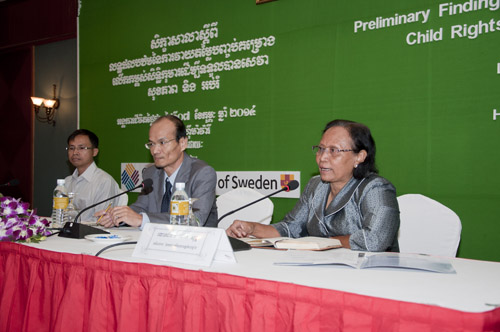Phnom Penh (Feb 07, 2014) – The Project “Promoting Child Rights to Health and Education” was a great complement to the support for the government’s policy on child rights to improved education and health care, according to the preliminary findings of final evaluation on the implementation of the project presented at a half-day workshop today.
|
|
The project “Promoting Child Right to Health and Education”, was funded by Swedish International Development Cooperation Agency (Sida), channeled through Church of Sweden (CoS) and implemented by LWD. The project implementation started early 2012 and ended in December 2013. It costs US$ 1,470,000.
Speaking at the workshop, Mr. Puth Samitt, Deputy Director General for Education General Department of the Ministry of Education, Youth and Sport, expressed his deep thanks to LWD for its contribution to develop the education sector in Cambodia.
Lok Chumteav Daok Sothea, Deputy Governor of Kampong Chhnang province, said children education was the most important task of the government and its development partners to develop human resource of Cambodia. “Children are the pillar of the country,” she said.
Dr. Sam Inn, LWD Executive Director, said LWD’s PCRHE aimed to support the government’s efforts in improving health and education sectors in Cambodia. The project was designed to address health and education challenges which disadvantaged children and adolescents in rural communities under LWD’s target areas were facing.
|
|
The project supported disadvantaged children, and adolescents in rural communities in getting access to basic health care and education services of good quality. It also specifically focused on empowering parents, teachers, school support committees, village development committees and local authorities to actively participate in the support for the promotion of child rights to health and education.
“Education is a key sector for developing the country. The understanding about and respect of human rights, including children’s rights, will help Cambodia move on the right track towards prosperity,” Dr. Inn said.
Under the project’s action plan, many major achievements were accomplished. They included (i) 18 community pre-school buildings were constructed; (ii) 973 children (583 of them are girls) received home care education; (iii) 5 primary school buildings of 25 classrooms and one lower secondary school building of 5 classrooms were built; (iv) 3,725 children (2,235 of them are girls) received scholarship support; (v) 16 classes of non-formal education were established; (vi) 1,0736 community members (6,441 of them are women), 1,278 community leaders (767 of them are women), 127 commune councilors (76 of them are women), and 6,640 teachers and students received awareness on child rights to education and protection, according to the findings.
The evaluation, led by an external independent consultant, aimed to assess the relevancy and effectiveness of the project implementation during the two-year term.
The Team also found that the capacity of mothers about mother and child health care, hygiene and sanitation, nutrition and child rights has increased. The project’s action plan was achieved beyond expectations. But, some gaps were also found, the report said.


